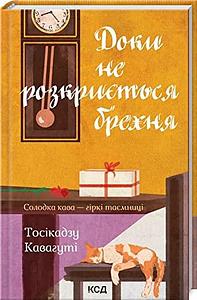You need to sign in or sign up before continuing.
Take a photo of a barcode or cover
lighthearted
reflective
relaxing
fast-paced
Plot or Character Driven:
Character
Strong character development:
Yes
Loveable characters:
Yes
Diverse cast of characters:
Yes
Flaws of characters a main focus:
No
Everything was really good; well written. However, the author could use a little less repetition in the narration.
emotional
hopeful
lighthearted
sad
medium-paced
Plot or Character Driven:
Character
Strong character development:
Yes
Loveable characters:
Yes
Diverse cast of characters:
No
Flaws of characters a main focus:
No
emotional
hopeful
inspiring
mysterious
reflective
medium-paced
Plot or Character Driven:
Character
Strong character development:
Yes
Loveable characters:
Yes
Diverse cast of characters:
Yes
Flaws of characters a main focus:
Yes
Additional stories that span after the events of Before the Coffee Gets Cold.
There are a lot of 'rules' when going back in time, but I will say that the author does find interesting ways to have characters utilize the space and ability to do so. Each chapter could basically be considered its own little short story, within the grander narrative.
The small individual stories/characters themselves are okay, but I'm getting interested in the greater plot of the owners and employees of the coffee shop. Most of the time, the smaller stories are just emotional thought pieces. Character A wants to go back in time to say sorry or thank you, because their loved one passed away or they themselves are sick.
With the coffee shop usually so dead (usually filled with just the character that wants to go back or forward in time), I'm hesitant in 'believing' that all of these characters have already visited the shop in the past. It also makes my logistical side come out and try to think about how the shop stays in business, with little to no business. But, these are quirky short novels. Try not to look too deeply behind the scenes.
There are a lot of 'rules' when going back in time, but I will say that the author does find interesting ways to have characters utilize the space and ability to do so. Each chapter could basically be considered its own little short story, within the grander narrative.
The small individual stories/characters themselves are okay, but I'm getting interested in the greater plot of the owners and employees of the coffee shop. Most of the time, the smaller stories are just emotional thought pieces. Character A wants to go back in time to say sorry or thank you, because their loved one passed away or they themselves are sick.
With the coffee shop usually so dead (usually filled with just the character that wants to go back or forward in time), I'm hesitant in 'believing' that all of these characters have already visited the shop in the past. It also makes my logistical side come out and try to think about how the shop stays in business, with little to no business. But, these are quirky short novels. Try not to look too deeply behind the scenes.
emotional
hopeful
lighthearted
reflective
relaxing
sad
fast-paced
Plot or Character Driven:
Character
Strong character development:
Yes
Loveable characters:
Yes
Diverse cast of characters:
No
Flaws of characters a main focus:
Complicated
Where the first book introduced the premise with four moving stories, this second one expands the tapestry, layering in new visitors, deeper histories, and more entangled relationships.
The structure is familiar: each chapter centers on a character who longs to revisit the past. But this time, the stories carry a slightly different weight. They don’t just circle around lost love or regret; they also tackle guilt, inheritance, secrecy, and the burdens we pass from one generation to the next. There’s a richness here that feels like Kawaguchi stretching the café’s magic a little further, while still keeping it rooted in the small, human moments that made the first book so moving.
The writing is again simple and dialogue-heavy, with the same ritualistic repetition of rules and conditions. For some, that might feel overly deliberate. But I found it grounding - like the steady tick of a clock in the background, reminding us that time is both constraint and gift.
What struck me the most is how it embraces community. In the first book, the stories felt more self-contained. Here, characters weave in and out of each other’s lives, creating a sense of continuity and shared healing. It’s less about isolated grief and more about how our lives intersect, how our choices ripple outward.
I found myself connecting to the generational stories - the weight of family secrets, the impossibility of fully knowing those we love, and the fragile chance of reconciliation.
By the end, I was reminded why this series works so well: it doesn’t promise miracles. It offers instead a kind of modest grace - the possibility that a single conversation, even across time, can change how you carry your life forward.
Tender, reflective, and quietly devastating. Kawaguchi has built not just a café where time travel is possible, but a world where longing itself feels honored.
The structure is familiar: each chapter centers on a character who longs to revisit the past. But this time, the stories carry a slightly different weight. They don’t just circle around lost love or regret; they also tackle guilt, inheritance, secrecy, and the burdens we pass from one generation to the next. There’s a richness here that feels like Kawaguchi stretching the café’s magic a little further, while still keeping it rooted in the small, human moments that made the first book so moving.
The writing is again simple and dialogue-heavy, with the same ritualistic repetition of rules and conditions. For some, that might feel overly deliberate. But I found it grounding - like the steady tick of a clock in the background, reminding us that time is both constraint and gift.
What struck me the most is how it embraces community. In the first book, the stories felt more self-contained. Here, characters weave in and out of each other’s lives, creating a sense of continuity and shared healing. It’s less about isolated grief and more about how our lives intersect, how our choices ripple outward.
I found myself connecting to the generational stories - the weight of family secrets, the impossibility of fully knowing those we love, and the fragile chance of reconciliation.
By the end, I was reminded why this series works so well: it doesn’t promise miracles. It offers instead a kind of modest grace - the possibility that a single conversation, even across time, can change how you carry your life forward.
Tender, reflective, and quietly devastating. Kawaguchi has built not just a café where time travel is possible, but a world where longing itself feels honored.
reflective
relaxing
fast-paced
Plot or Character Driven:
Character
Strong character development:
Yes
Loveable characters:
Yes
Diverse cast of characters:
Yes
Flaws of characters a main focus:
No
adventurous
emotional
inspiring
mysterious
reflective
sad
medium-paced
I like this series. The stories are emotional, but quick, and not entirely predictable. Short stories are growing on me.
emotional
hopeful
reflective
slow-paced
Plot or Character Driven:
Character
Loveable characters:
Yes
emotional
hopeful
sad
fast-paced
Loveable characters:
Yes







